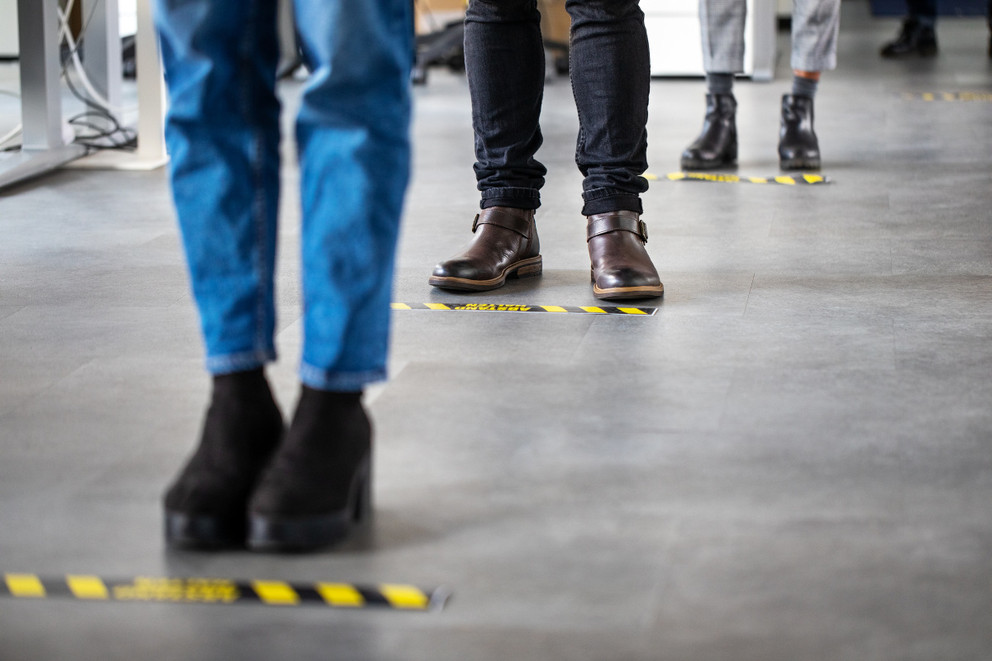
The sharp rise in COVID-19 cases throughout Pennsylvania and across the United States makes continued vigilance with established safety efforts essential to helping slow the virus’s spread. Yet after nine months of social distancing, masking and quarantining, many are experiencing pandemic fatigue. Whether it manifests as anxiety, exhaustion or defiance, it’s important to recognize and address it for the sake of our physical and emotional health.
A long and uncertain pandemic
Health care providers on the frontlines of the COVID battle have seen how approaches to treatment and prevention have evolved, sometimes seemingly overnight, often resulting in a sense of uncertainty, anxiety or even doubt with the public.
“It’s been like drinking out of a firehose,” said Dr. Jonathan Nunez, an internal medicine physician at Penn State Health Milton S. Hershey Medical Center, reflecting on the last several months of the pandemic. “Every day we’ve learned something new.”
One of the most significant evolutions he has witnessed — one that may have played a role in some people’s continued unwillingness to mask properly — is guidance on face coverings for the general public.
“At first, we were told that only health care workers needed to wear a mask,” Nunez said. “But since those early days, there’s been a lot of evidence overall that wearing masks may definitely slow the spread of the virus and help people from transmitting it to others, especially if they’re asymptomatic.”
Another theory from early in the pandemic was that the warmer weather over the summer would potentially halt the virus, as it does with other seasonal respiratory diseases. “Super spreader events in the form of outdoor gatherings showed that this unfortunately wasn’t the case for COVID,” Nunez said.
Nunez advises that anyone considering in-person activities like dining out or shopping make sure that everyone in the establishment is abiding by the rules. “Are they wearing masks, covering the whole face, sitting six feet apart?” he asked, adding that even with these measures, “there is no absolute decreased risk.” He prefers creative solutions to social gatherings. “Most of my inspiration has come from the internal medicine residents. They’ve been able to continue their game nights — virtually.”
Minding your mental health
The relentless pace of the pandemic and the resulting social distancing restrictions have been exhausting and stressful, explains Dr. Julie Graziane, a psychiatrist at the Milton S. Hershey Medical Center. “But there are things that we can do to help mitigate a lot of those stressful emotions,” she said.
Graziane suggests an emotional reframing of quarantines and social distancing restrictions. “Don’t think of them as things we’re being forced to follow, but rather as actions we’re freely choosing to do to help others,” she said. “We shift it into an altruistic action as we do these things to help our loved one, our neighbor, even the stranger in the community that we care about.”
The colder weather and fewer hours of daylight can add to the emotional burden of that COVID causes.
“We’ve been watchful with mental health as individuals experience significant emotional stress during the pandemic,” Graziane said. “And we’re especially concerned as we head into the winter months that play a role in some people’s depression.”
One significant stressor from COVID that Graziane points to is the disruption to routines, such as getting the kids on the bus in the mornings or driving to work. She recommends establishing new routines.
“Have a regular awake time or regular sleep time, and regular meal times,” Graziane said. “Then take some time during the day to check in with yourself, how you’re feeling about the day, the situation. Incorporating healthy activities like exercise and mindfulness, and then pleasurable activities.”
Reflecting on what was important to them and provided meaning to their lives prior to the pandemic can help people find strength and purpose as quarantines continue, Graziane said. “And don’t be afraid to reach out for help. If you feel like you’re struggling with getting through this, talk to someone such as a loved one, a physician, a counselor or a friend.”
Nunez stresses that we take the time to check in with others. “Maybe someone you know is struggling and just because you don’t ask, they don’t mention it,” he said. “We’re all going through this. We are not alone.”
Hopeful while remaining vigilant
While recent news that an effective vaccine is expected to come to market soon points to an eventual end to the pandemic and its social restrictions, both Graziane and Nunez stress that the general population is still perhaps months away from being able to receive the two-part vaccination.
“For now, we must remain ever vigilant,” Graziane said.
That includes celebrating the holidays very differently this year.
“I think what’s important this holiday season is remembering that we’re trying to stay healthy and we’re also really trying to keep others healthy,” said Nunez, “especially our patients who are vulnerable and at risk for severe complications of the disease.”
Original source: https://news.psu.edu/story/638830/2020/11/12/medical-minute-overcoming-pandemic-fatigue?utm_source=newswire&utm_medium=email&utm_term=638993_HTML&utm_content=11-12-2020-21-33&utm_campaign=Penn%20State%20Today